The Inaugural Annual Conference of Government and Economics
On April 27, 2019, the Launch Ceremony of the Society for the Analysis of Government and Economics (SAGE) and the Inaugural Annual Conference on Government and Economics took place at the Mong Man Wai Concert Hall of Tsinghua University. Chen Xu, secretary of the CPC Committee of Tsinghua University and chairman of the School Affairs Committee, and Li Daokui, initiator and co-founding president of SAGE, as well as the president of ACCEPT, both addressed the conference.
Other invited speakers of the conference included: Eric S. Maskin, winner of the 2007 Nobel Prize in Economics and professor of economics and mathematics at Harvard University; Jan Svejnar, professor and director of the Center on Global Economic Governance at Columbia University; Erik Berglof, professor and director of the Institute for Global Affairs at the London School of Economics; Cai Fang, vice president of the Chinese Academy of Social Sciences; Lin Yifu, dean of the Institute of New Structural Economics at Peking University; Liu Yuanchun, vice president of Renmin University of China; Bai Chong'en, dean of the School of Economics and Management at Tsinghua University; Yao Yang, dean of the National School of Development at Peking University; Dong Zhiyong, dean of the School of Economics at Peking University; Wen Yi, assistant vice president at the Federal Reserve Bank of St. Louis; and Zhou Li'an, vice dean of the Guanghua School of Management at Peking University. Li Ke'aobo, vice president of ACCEPT, presided over the meeting.
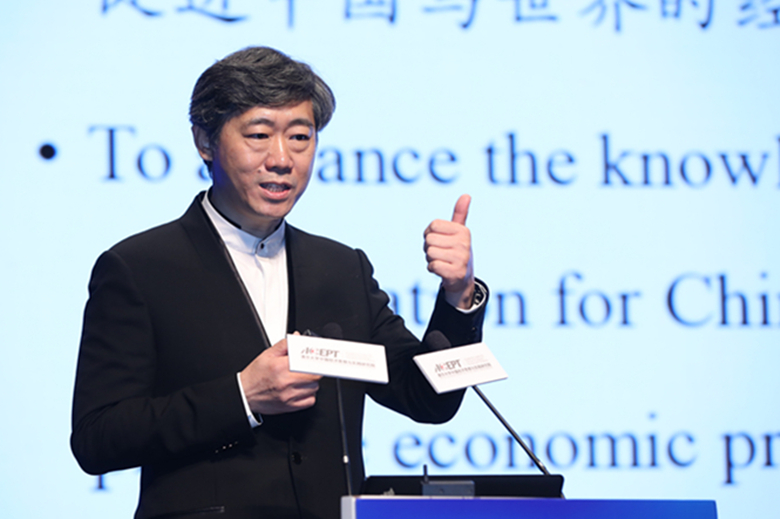
In his opening remarks, Li Daokui first gave an introduction of ACCEPT, which was founded during Tsinghua University's anniversary celebrations last year. During his speech, President Li explained that the mission of ACCEPT is to provide the world with new knowledge on economics based on China's economic practice and thinking since its reform and opening-up. According to his research, President Li has found that if a country's economic growth is to contribute to the development of academic theory, three conditions must be satisfied: First, growth must be sustainable—in this respect, China's rapid growth has been sustained for over four decades and is far from over. Second, other economies must benefit from the results of such rapid growth—the Belt and Road Forum and its importance to the international community serves as proof that China's economy meets this condition. Third, the country needs to work with international scholars to elaborate on their practical achievements and refine them at the theoretical level.
On this basis, SAGE has made clear its development goals. First, we shall construct a new branch of economics called "Government and Market Economics" to clarify the role of the government in economic development. In this new branch of economics, we will regard the government as a promoter of and stakeholder in the market economy rather than a hindrance to it. Second, we shall put forth recommendations on major policy topics to further promote the national development of China. Third, we shall also advance the economics program at Tsinghua University through relevant research initiatives.
As his speech continued, Li Daokui remarked that the establishment of SAGE is based on ACCEPT's mission to promote the study of Government and Market Economics. SAGE hopes to encourage research on relevant topics including government incentives, behaviors, and roles in the market economy worldwide. As an international academic organization, SAGE avoids any prejudice of politics, social standing, business, or nationality, and has absorbed numerous top scholars from places such as the United States, Europe, China, and other developing countries. Eric Maskin, winner of the 2007 Nobel Prize in Economics and professor of economics at Harvard University, joined Li Daokui as co-founding president of SAGE.
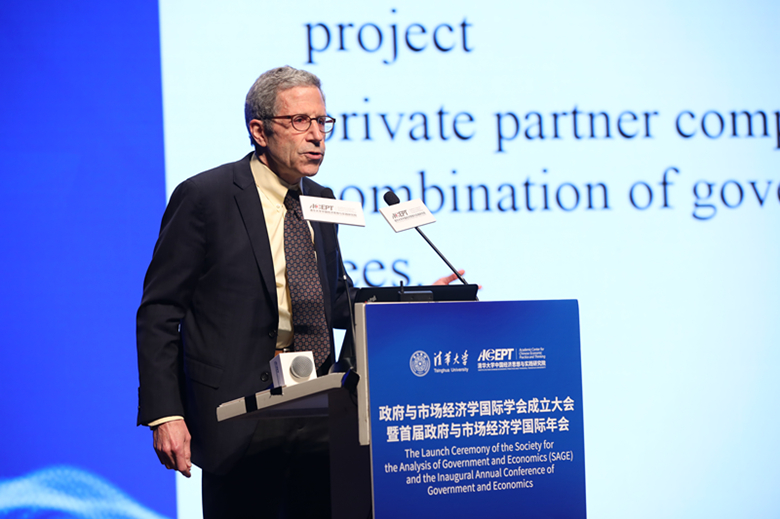
Following Li Daokui's opening remarks, Eric Maskin took the stage as the first guest speaker. Using the mechanism of PPP (Public-Private Partnership) as his starting point, Dr. Maskin began an exchange with conference participants and the audience on the relationship between the government and the market economy. During this exchange, Maskin argued that the endogenous problems of the medical, health, taxation, and even pharmaceutical industries cannot be effectively solved through the market due to the massive investment, high risk, and provision of public goods and services in these sectors. Thus, the government must work together with knowledgeable private enterprises to jointly develop and execute projects. Within this context, Maskin believes that the Chinese government cannot be viewed as a single institution because the central government and local governments have conflicting interests on certain issues. For example, local governments may opt for high-cost but eye-catching "face-job projects" in order to meet their performance requirements. However, the PPP mechanism can alleviate this issue by allowing the central government to share costs with local governments and contractors so as to eliminate high-cost projects, minimize errors, and meet numerous policy goals.
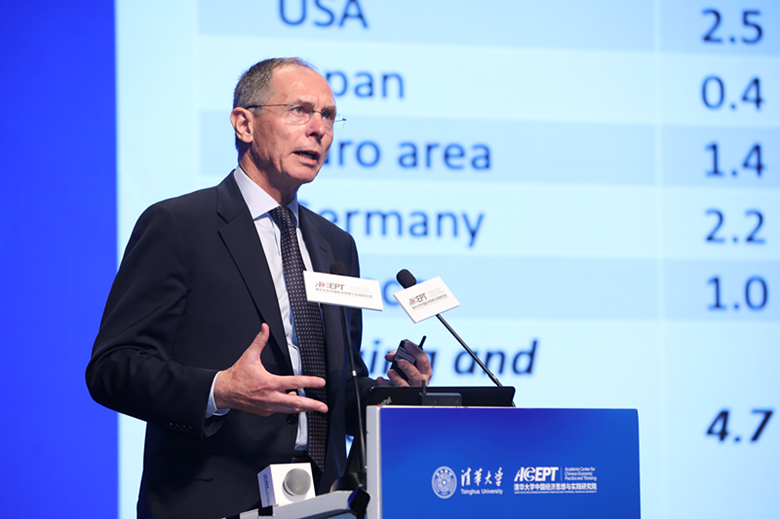
Next, Jan Svejnar began his remarks with recognition of the progress achieved by China in economic growth and academic fields in recent years, followed by a comparison of the development of major economies worldwide over the past two centuries. Svejnar believes that during the transformation of economic structure, the government and the state play increasingly critical and diverse roles, which is also one of the reasons for the founding of SAGE. There is no one-size-fits-all approach to rapid economic growth—China, Southeast Asia, and European countries each have individual characteristics that necessitate different economic strategies. Since its reform and opening-up, China has been liberated from the Soviet Union system and carried out substantial institutional reforms. As a result, China has accumulated the expertise to maintain long-term growth over the past four decades. The experiences of China, the United States, Europe, Japan, and other countries and regions can be summarized as follows: First, the market mechanism is incredibly important. All successful economies emphasize the role of the market in resource allocation. Second, measures of macro-control implemented by the government also play a key role in the foresight, guidance, and mobilization of market behavior, especially in research and development, education, and infrastructure.
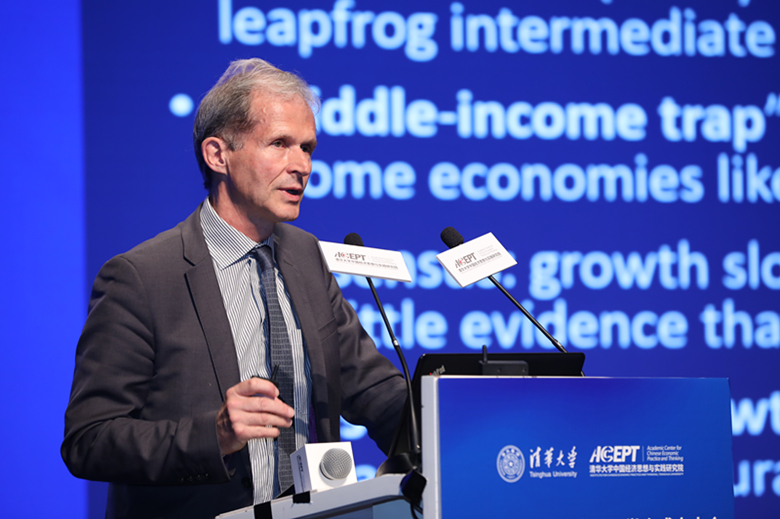
Erik Berglof then analyzed the impact of national industrial policies on economic development from the perspective of ways to avoid the middle-income trap. Berglof holds that it is quite difficult for a single economy to move from middle to high income. Such factors as structural adjustment, social equity, technological change, AI, environmental pollution, and employment reduction constitute constraints on emerging developing countries. If late-developing economies intend to achieve leapfrog development, corresponding industrial policies at the national level are indispensable. First, the government must be able to provide sufficient public goods. Second, the government should have an independent bureaucracy mechanism to promote first-mover advantages. Third, the government’s judicial and administrative systems must be independent from one another and have the ability to maintain and enforce competition mechanisms. According to Berglof, the results of competition vary at different stages of development, and the effects of competition may not meet government expectations. Therefore, during transitional periods such as the adjustment of industrial capacity, the government must boldly abandon uncompetitive enterprises, reduce the degree of enterprise decentralization, and work toward improving energy efficiency and reducing pollution. In addition, the government should also identify its weaknesses and support and supplement specific sectors with vertical industrial policies so as to enhance overall economic growth. Berglof believes that China in transition has both the potential and the ability to move toward a higher income level.
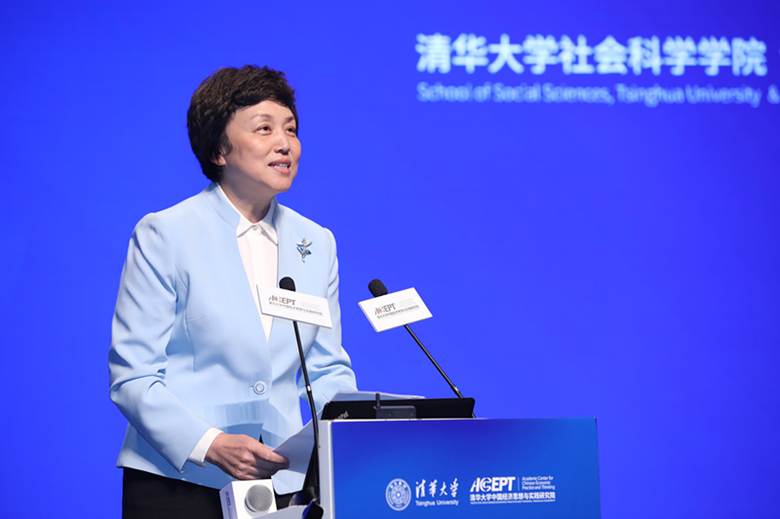
At the launch ceremony of SAGE, Chen Xu, chairman of the School Affairs Committee and secretary of the CPC Committee of Tsinghua University, delivered a speech on behalf of the university to congratulate SAGE on its establishment. Chen Xu said that Tsinghua University has always attached great importance to the development of economic studies. Since the establishment of the Department of Economics in 1926, the university has achieved fruitful results in personnel training, scientific research, and international exchanges. Through the establishment of ACCEPT and the founding of SAGE, the university hopes to create a platform for international cooperation in related fields and make theoretical contributions to the development of economics—a cause for joy both within the international community of economists and at Tsinghua University.
Subsequently, Eric Maskin took the stage once again and read a letter of congratulations from the International Economic Association (IEA) and the American Economic Association (AEA). In the letter, IEA Chairman Kaushik Basu wrote that he was very pleased to learn about the founding of SAGE. He said he was full of confidence in Professor Eric Maskin and Professor Li Daokui as the founding chairmen and looked forward to their contributions. Ben Bernanke, chairman of the AEA and former Federal Reserve Chairman, pointed out that governments and their policies play a vital role in all economies. He expressed his strong support for the founding of SAGE and said that he hoped the research work of SAGE would further deepen people’s understanding of the relationship between government and economy.
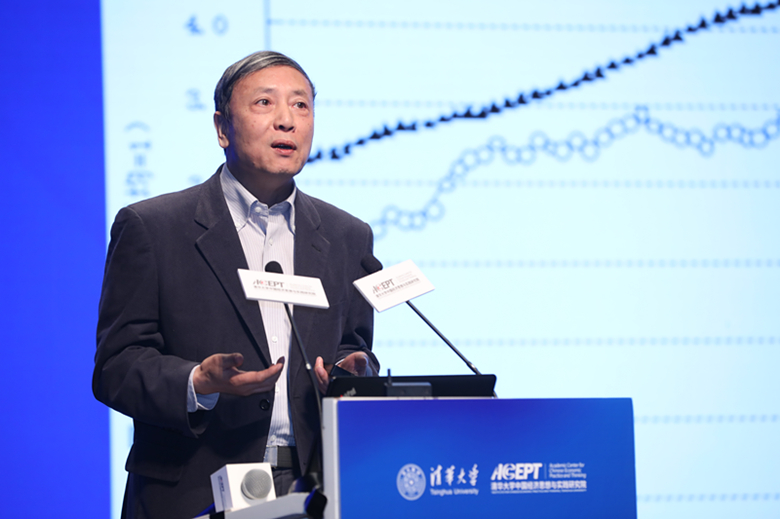
In Cai Fang’s remarks, he held that the year 1990 serves as the point of divergence for the international trade pattern. In the years before 1990, developing countries and former planned economies were relatively less involved in international trade, whereas the opposite held true afterward. As a result, middle-income countries and low-income countries have tended to benefit from globalization, thus speeding up their development. In contrast to this phenomenon, the income of high-income countries has declined in relative terms, and the world economy has converged for the first time. The population stricken by absolute poverty in the world has decreased dramatically since the 1990s, of which China has contributed 76%. However, the benefits of globalization have not been equally distributed. The increase in capital gains in the United States has not been shared by all workers, resulting in a decline in the population of the middle class and the disappearance of jobs in intermediate skills industries. For China, the abundant labor supply before 2004 prevented the wage level from obviously increasing. After 2004, a shortage of labor led to the rapid increase of wages, the disappearance of the demographic dividend, and the decline of the growth speed of the total factor productivity brought about by capital allocation. To sustain future growth, we need more sufficient competition and Schumpeterian creative destruction. Which is better, the government or the market? How can they be integrated? Opinions on such issues change with the times.
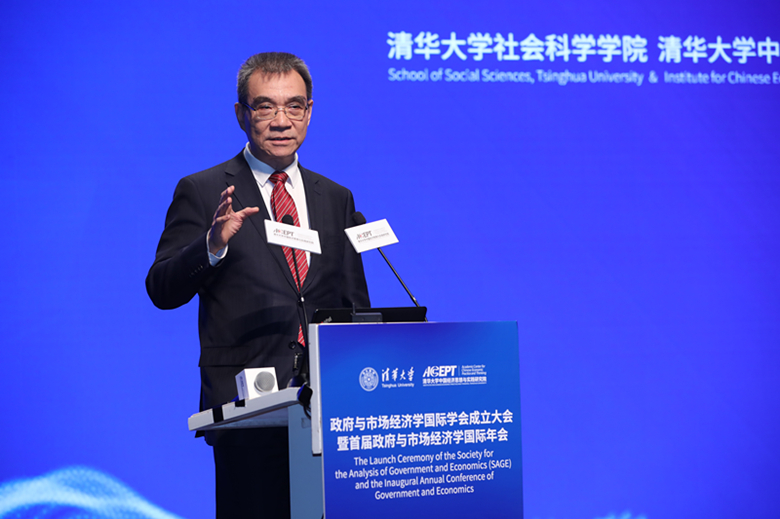
According to Lin Yifu, China’s development over the past seven decades since the founding of the People’s Republic of China is a gold mine for economic theory innovation. Reform and opening-up was a gradual process, not an overnight shift to market orientation and macro-stability. Although the mainstream international view at that time saw China’s transition method as the worst possible strategy, China achieved four decades of stable and rapid growth, which can be seen as a miracle in the history of the world economy. Whoever is capable of explaining the driving forces behind such a miracle will be able to put forth new theories in this respect. The SAGE, founded by Li Daokui and Eric Maskin, has three favorable conditions to help it accomplish this task: optimal timing, geographical convenience, and teamwork. Mainstream theories tend to neglect the endogenous economic structure and the distorted endogenous nature of economies in transition, so they often fail to explain reasons for growth in specific cases. Developing countries have no comparative advantages in capital-intensive industries and no self-generating capacity. To achieve growth, they must rely on government subsidies for protection. However, distorted government intervention leads to the misallocation of resources and the distortion of incentives, so such growth is also unsuccessful. Many countries in transition adopt the market-oriented mechanism, where the market plays a decisive role, and advocate for the clear-cut privatization of property rights as well as measures of ensuring macro-stability. However, they overlook the fact that the subsidy for protection that existed before the transitional period is a distortion in itself. After the withdrawal of subsidies, these industries will inevitably go bankrupt, resulting in a high rate of unemployment. From the perspective of new structural economics, it is crucial to effectively manage the relationship between the government and the market during economic development and transition. Only through the market can resources be well-allocated. With competition, incentives can be given for innovation, and there will be compensation for pioneers. In the meantime, during industrial upgrading and technological innovation, the government should play a role in enhancing education, finance, and infrastructure construction.
Lin Yifu pointed out that there was a common phenomenon during the application of mainstream economics in developing countries: these countries could elaborate on the issues very clearly, but when they attempted to replicate the methods of mainstream economics, they failed. Dr. Lin expressed that it is very fitting for the newly established SAGE to focus on Government and Market Economics. He conveyed his wishes that SAGE can help developing countries to better understand the world. The Institute of New Structural Economics at Peking University looks forward to serving as a member of SAGE to seize the opportunity of the times and promote the development of economic theories.
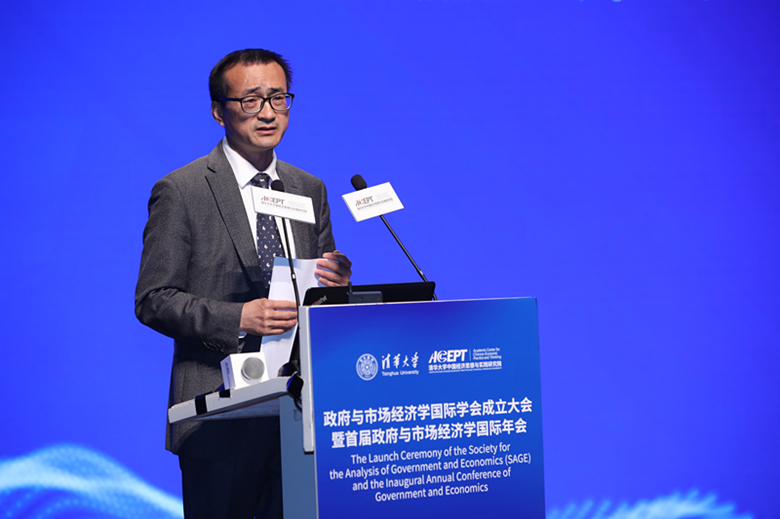
From the perspective of Liu Yuanchun, the relationship between the Chinese government and the market is not parallel and does not allow one to be substituted for the other, unlike the Western countries, which have markets first before establishing a sovereign state. The market economy in China was gradually established under the leadership of the government. From the historical school to structuralism, from institutional economics to new political economics, the traditional theoretical paradigms and focus points in the West are not completely consistent with the Chinese model. This is because the rise of the Chinese economy has not been a simple process of modernization of a backward country, nor a simple transition from a closed country to an open one, nor does it represent a model of early industrialization led by a pioneering country. Therefore, there are many shortcomings in explaining China’s phenomena with growth theory, development theory, or other theories. Liu Yuanchun pointed out that the issues manifested by such deficiencies come from the fact that the ideal paradigm of resource allocation set by standard economics is not consistent with that of China. The birth of the Chinese market did not follow the logic of market failure and government intervention. On the contrary, the Chinese market economy has been developed under the premise of leadership by the government, and through continuous opening and reform efforts, the Chinese market now features relatively competitive market players, market systems, and market mechanisms. Liu Yuanchun firmly believes that the rise of China has provided a factual case of success with promising potential for theoretical researchers.
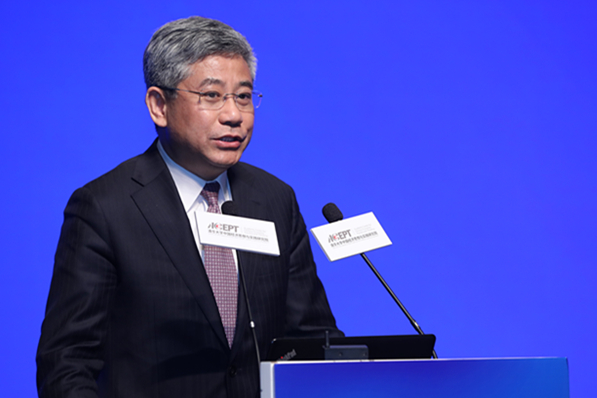
In the view of Bai Chong’en, there are two dimensions for infrastructure construction: one is material, and the other is institutional. Over the past four decades, the Chinese government has made tremendous efforts to improve the system, but such efforts have been inadequate. Within this imperfect system, which even has conflicting rules among different departments, the government is often faced with a dilemma when managing the relationship between government and business. If the government opts for working in a step-by-step manner, it might not be conducive to economic development; yet if the government offers preferential treatments, it will go against the principle of equality. Bai Chong’en pointed out that although establishing an inclusive business environment would be the most ideal scenario, preferential approaches have still played a critical role in China’s economic development during its long transitional period. Under certain historical conditions, if we pursue perfection excessively, we may lose the chance for progress.
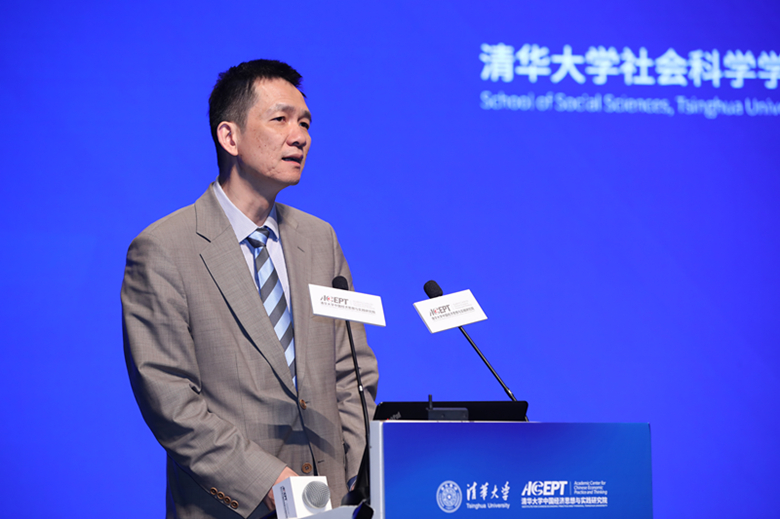
Yao Yang believes that China’s rapid growth over the past forty years is not unique on the economic level. To explore the secret of China’s success, we need to study the role of the government and why the Chinese government has been able to adopt optimal economic policies. To grasp the essence of China’s political economy, we should first study the changes of the Communist Party of China (CPC), and then study ways to motivate, select, and train officials. Since reform and opening-up, the institutionalization of the CPC, the neutralization of the government, the return of pragmatic philosophy, the model of state governance characterized by decentralization, and the system for selecting officials have jointly contributed to the rapid development of China in all aspects of economy and society. Yao Yang expressed congratulations for the founding of SAGE and said he viewed it as a move ahead of its time, which will play a positive role in promoting China’s political economics research. The National School of Development at Peking University is willing to become part of SAGE and enhance the progress of economics in China.
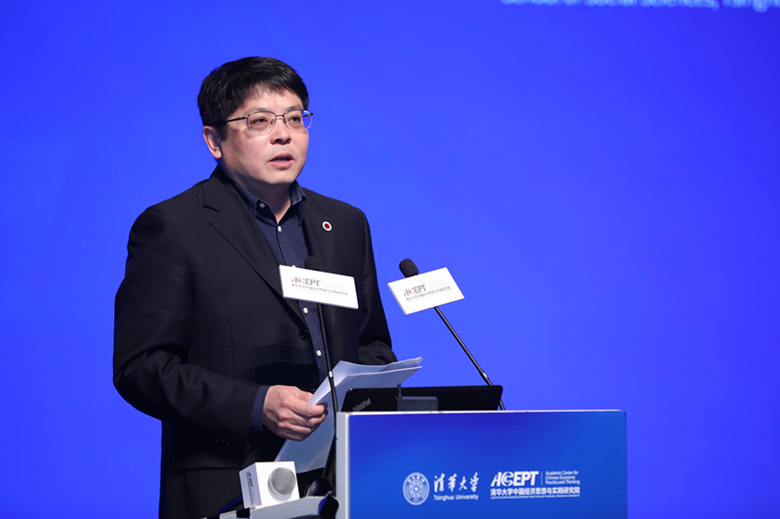
Dong Zhiyong remarked that the great success of China’s reform and opening-up is attributed to the country’s transition in several aspects: from a planned economy to a market economy, from a closed economy to an open one, from protection of individual rights via the state to protection via property rights, from resource allocation via government officials to allocation via entrepreneurs, and from a central mobilization growth model to a local competition one. Dong Zhiyong believes that China’s economic development over the past forty years can provide more and better examples for the research on the relationship between the government and the market. He shared his insights from five aspects, namely, the state-owned economy, industrial policy, macro-control, resource allocation and creation, self-correction by the government, and the welfare of the people.
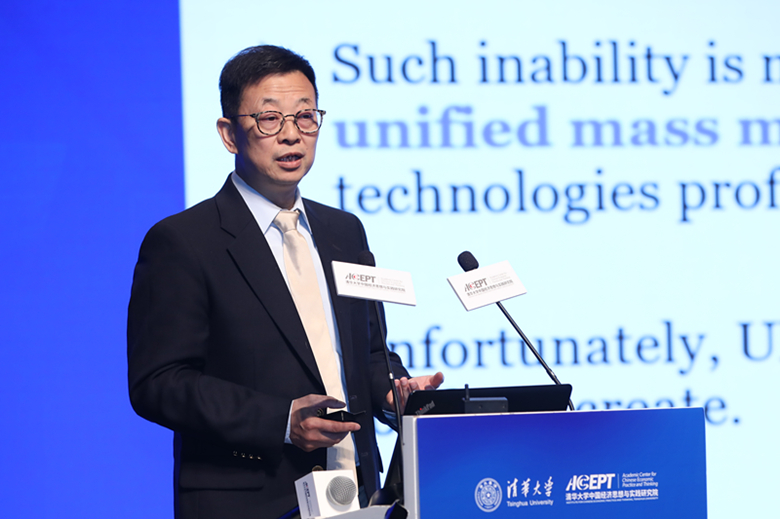
From the perspective of Wen Yi, the modern industrial society is a complex organism created and shaped by the state in stages. Judging from the history of the United Kingdom, the United States, Japan, and China, large-scale production is essential for the market mechanism to play a role during industrialization. The cultivation of the market’s breadth and depth cannot be separated from the government’s visible hand. Wen Yi believes that soft infrastructure, such as social welfare and democratic politics, is usually the result of socio-economic development rather than the cause. Some of the advantages of the West are endogenous growth patterns driven by industrialization, which cannot be copied blindly. In sum, to achieve industrialization and move toward prosperity, it is necessary to have a strong central government to implement the right industrial policies. The government must study the market law so as to follow it, which also constitutes the significance of the establishment of SAGE.
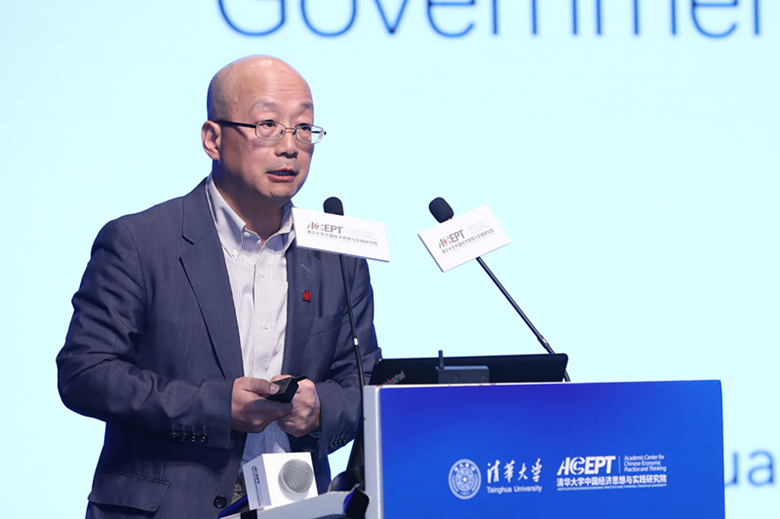
As the last keynote speaker, Zhou Li’an shed light on the interaction between the Chinese government and the market. He believes that China has created a so-called model of dual market competition—also known as the official + market competition model—which has facilitated growth. A vital indicator for promoting local officials is the measurement of economic development performance—either GDP, or fiscal revenue and taxation, or both—but the core element is determined by the market value added of local enterprises. Therefore, the competition between different regional officials and enterprises is linked, thus motivating officials in the jurisdiction to collaborate closely with local enterprises, or to ensure the competitiveness of local enterprises in the market through industrial policies or other ways of cooperation. Such competition provides officials with a strong incentive to improve the local business environment through the cross-regional flow of market factors. In this way, the government is transformed from the “grabbing hand” to “helping hand.” However, Zhou Li’an also cautioned that this model is imperfect because the logic of bureaucracy and that of market competition differ substantially, possibly leading to problems.
After the meeting, discussions were held on relevant papers in the Schwarzman College among numerous experts and scholars from Tsinghua University, the Chinese Academy of Social Sciences, Renmin University of China, Fudan University, Shanghai Jiaotong University, Sun Yat-sen University, Wuhan University, the Central University of Finance and Economics, and the China-Europe International Business College. In addition, participants exchanged their in-depth insights on the economic incentives provided by the government, the government’s role as a vital participant in the market economy, and the impact of the government on the economy.




